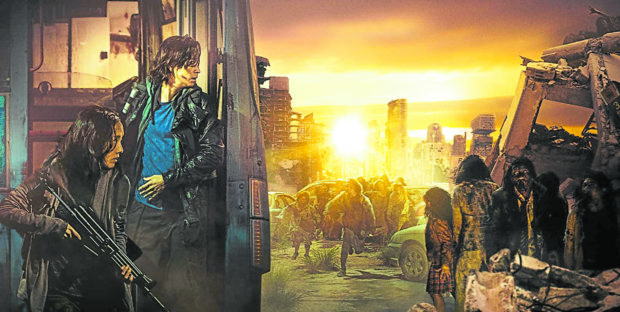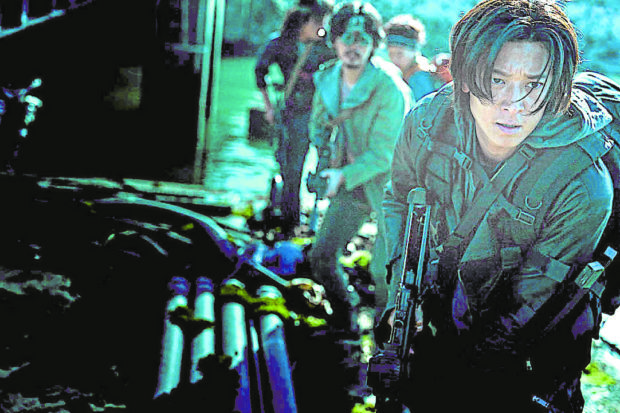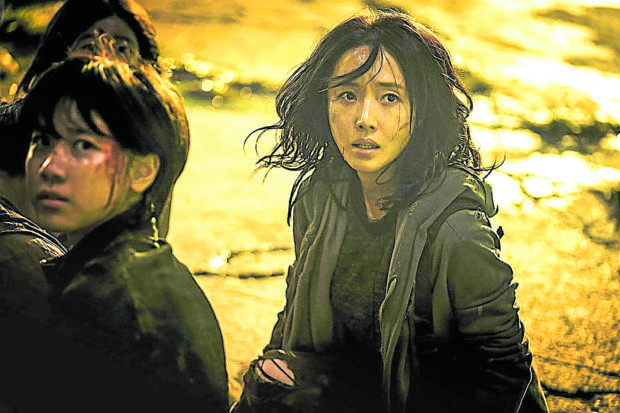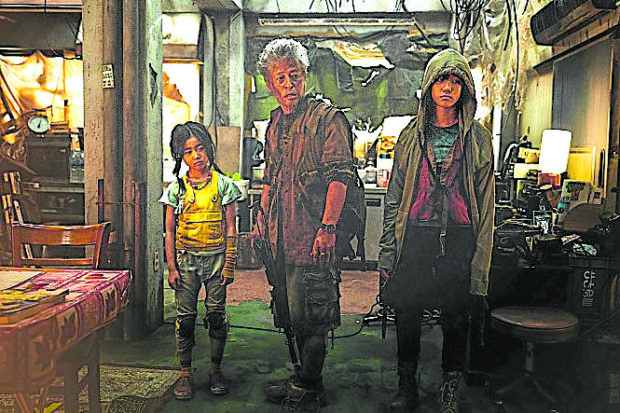‘Peninsula’: Stand-alone story fuels action-packed ‘Train to Busan’ sequel
If you watch Yeon Sang-ho’s “Peninsula” and expect to see a zombie-infested speeding train that’s bursting at the seams with people hanging on for dear life, get ready to be disappointed.
The eagerly anticipated sequel of “Train to Busan,” which starred Gong Yoo, Jung Yu-mi, Don Lee and Choi Woo-shik and grossed $93.1 million worldwide, doesn’t have scenes on a train and isn’t even set in Busan.
Last week, the film opened at No. 1 in South Korea, Taiwan, Malaysia and Singapore, and is set to open next in Thailand, Denmark, Norway, Sweden and Cambodia. With the Philippines’ inability to curb its continually surging cases, we doubt if we’ll be ready to reopen our theaters anytime soon. But since Sec. Harry Roque thinks “we’re winning” against experts’ grim projection, who knows, right?
The brand-new movie fields a stand-alone story that follows a different set of characters as it casts a stark silhouette of postapocalyptic Seoul in the “Mad Max”-channeling aftermath of the events in the 2016 global hit.While the novelty surrounding the flesh-chewing creatures is gravely dissipated, the film manages to cleverly repurpose tired formula in spinning its timely allegory. In this cautionary tale, the ravenous zombies in the overrun Korean peninsula, now sealed from the rest of the world to prevent further contagion, are utilized to frame the slam-bang action drama as it dispenses lessons on guilt, sacrifice and redemption. Seeing how life as we know it has since been overhauled by the pesky Covid-19 pandemic, the irony that its story has transmogrified from allegory to reality in four years’ time isn’t lost on us.
“Peninsula’s” story takes place four years after Seok-woo (Gong Yoo) makes the ultimate sacrifice. But elsewhere during the same time frame, world-weary army captain Jung-seok (Gang Dong-won), with grief-stricken brother-in-law Chul-min (Kim Do-yoon) in tow, manages to sneak out of Korea and into Hong Kong after failing to save his sister and niece from the undead.
Article continues after this advertisementTo make ends meet, Jung-seok and Chul-min are left with no recourse but to work for a crime lord who then sends them, along with two other Korean refugees, on a financially lucrative do-or-die mission to Seoul. They’re tasked to retrieve a bag that’s hidden in a truck—with millions of dollars inside it. If they succeed, they get half of the stash.
Article continues after this advertisementBut that’s easier said than done. They may be able to work their way around the famished creatures, but can they outwit Unit 631, the organized gang of thieves led by Caption Seo (Koo Kyo-hwan) and Sergeant Hwang (Kim Min-jae) lording over Seoul’s urban jungle?
While Jung-seok’s team is clearly outnumbered by two groups of antagonists, it soon gets much-needed reinforcement from a band of unlikely warriors made up of ass-kicking single mother Min-jung (Lee Jung-hyun), her similarly badass daughters, daredevil teen driver Joon (Lee Re) and street-smart Yu-jin (Lee Ye-won), and an old man (Kwon Hae-hyo).
The quartet may not look much, but there’s certainly more to their frail countenance than meets the eye. Let’s just say they’re as fast as they are, well, furious. And Min-jung gets even fiercer when she realizes that Jun-seok was one of the many men who refused to help her frantic family leave Seoul four years ago!
Part of “Train to Busan’s” draw is the thrill it generates from seeing desperate characters getting stuck in confined spaces while relentless zombies give chase. But in this sequel of moving vehicles and open spaces, much of the first film’s claustrophobic tension is understandably compromised.
In place of this crucial element in horror films are edge-of-your-seat car chases and, hold your breath, man-versus-monster duels staged by Unit 631 in a caged arena.
Don’t get us wrong, there’s much to like about “Peninsula”—from the cast’s terrific performances and the production’s urgent pacing, to the fabulously realized set pieces that include zombies hurtling down from the sky or a cabin on a boat full of newly infected victims. Like “Busan,” “Peninsula’s” family-drama component is just as potent, albeit lengthier and with a wee bit more schmaltz. It also banks on predictable formula to keep the storytelling tedium at bay, including crowd-pleasing sequences showing arrogant men finally getting their comeuppance or the protagonists’ mad rush to safety.
Throughout the stark images of death, destruction and moral decay in this veritable wasteland hovers a larger-than-life figure—a ray of hope—expected to save the humans trapped in this forsaken peninsula, but whose existence no one can truly substantiate. It’s another case of art imitating life—just like the elusive Covid-19 vaccine we’ve all been praying for, so we can go back to how things were before we were cruelly thrust into the most abnormal “new normal” we’re forced to endure. INQ



